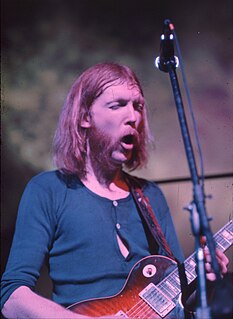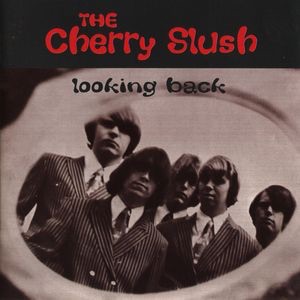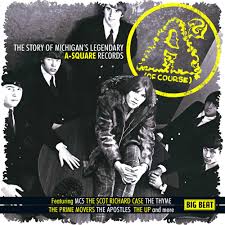Related Research Articles
Garage rock is a raw and energetic style of rock and roll that flourished in the mid-1960s, most notably in the United States and Canada, and has experienced a series of subsequent revivals. The style is characterized by basic chord structures played on electric guitars and other instruments, sometimes distorted through a fuzzbox, as well as often unsophisticated and occasionally aggressive lyrics and delivery. Its name derives from the perception that groups were often made up of young amateurs who rehearsed in the family garage, although many were professional.
? and the Mysterians are an American garage rock band from Bay City and Saginaw in Michigan, initially active between 1962 and 1969. Much of the band's music consisted of electric organ-driven garage rock and an enigmatic image inspired by the 1957 Japanese science fiction film The Mysterians. In addition, the band's sound was also marked by raw-resonating lead vocals of "?", making Question Mark and the Mysterians one of the earliest groups whose musical style is described as punk rock. Their music and imagery were highly influential on later bands.

Southern rock is a subgenre of rock music and a genre of Americana. It developed in the Southern United States from rock and roll, country music, and blues and is focused generally on electric guitars and vocals. Author Scott B. Bomar speculates the term "southern rock" may have been coined in 1972 by Mo Slotin, writing for Atlanta's underground paper, The Great Speckled Bird, in a review of an Allman Brothers Band concert.
Acid rock is a loosely defined type of rock music that evolved out of the mid-1960s garage punk movement and helped launch the psychedelic subculture. Named after lysergic acid diethylamide (LSD), the style is generally defined by heavy, distorted guitars, lyrics with drug references, and long improvised jams. Much of the style overlaps with 1960s garage punk, proto-metal, and early heavy, blues-based hard rock.

The Music Machine was an American rock band formed in Los Angeles, California in 1966. Fronted by chief songwriter and lead vocalist Sean Bonniwell, the band cultivated a characteristically dark and rebellious image reflected in an untamed musical approach. Sometimes it made use of distorted guitar lines and hallucinogenic organ parts, punctuated by Bonniwell's distinctively throaty vocals. Although they managed to attain national chart success only briefly with two singles, the Music Machine is today considered by many critics to be one of the groundbreaking acts of the 1960s. Their style is now recognized as a pioneering force in proto-punk; yet within a relatively short period of time, they began to employ more complex lyrical and instrumental arrangements that went beyond the typical garage band format.
The Monsoon Bassoon were an English independent rock band active between 1995 and 2001, notable for their exceptionally complex and energetic music. During their lifespan, the band won the NME's Single Of The Week award three times. They were an integral part of the "London math-rock" scene of the late 1990s and had a passionate underground following, particularly inspiring other bands.
Richard Allen Wagner was an American rock music guitarist, songwriter and author best known for his work with Alice Cooper, Lou Reed, and Kiss. He also fronted his own Michigan-based bands, The Frost and The Bossmen.
Psychedelic pop is pop music that contains musical characteristics associated with psychedelic music. Developing in the late 1960s, elements included "trippy" features such as fuzz guitars, tape manipulation, backwards recording, sitars, and Beach Boys-style harmonies, wedded to melodic songs with tight song structures. The style lasted into the early 1970s. It has seen revivals in subsequent decades by neo-psychedelic artists.

Underground Garage is the name shared by two related but different radio outlets, a syndicated show and a satellite radio station, both created and supervised by American musician Steven Van Zandt to present rock 'n' roll and garage rock on radio. Both outlets play a mixture of garage rock both old and new, and the music which influenced today's garage rock. On both the Sirius XM channel and on the syndicated show, one song is regularly proclaimed as "The Coolest Song in the World This Week."
Pitchblende may refer to:
The Cherry Slush was an American garage rock band formed in Saginaw, Michigan, in 1965, when the group was known as the Wayfarers and later cut records first as The Bells of Rhymny. They were composed of junior high school students in their 1964–1965 school year, and became a regional success in the Detroit, Michigan music scene. Musically, the band was inspired by The Byrds, who were achieving national success during the period. The group released four singles during their existence, most notably the two regional hits, "She'll Be Back" and "I Cannot Stop You". They were one of the few garage rock bands of the era to have a single chart on the three major listings, Billboard, Cashbox, and Record World.

Laurie Beebe Lewis is an American singer-songwriter. At age 14 she was the female lead singer of the Saginaw, Michigan cult-underground band Pitche Blende, a featured band on The Michigan Mixture Volume 1 album. She is most associated with her affiliation as the keyboard player and vocalist with Chicago's reformed group The Buckinghams from 1982 to 1985; and as lead singer in the reformed group The Mamas & The Papas from 1986 to 1993 with original members John Phillips and Denny Doherty, along with Spanky McFarlane.

The JuJus were an American garage rock band formed in Grand Rapids, Michigan, and active between 1964 and 1967. Though the group was never able to record an album they are considered one of the more polished acts to originate from the Michigan rock scene. Amid several line-up changes, The JuJus managed to blend influences of folk rock and The British Invasion into their raw musical style, before experimenting in the psychedelic rock genre. Their most acclaimed piece was the regional hit, "You Treat Me Bad", which is now deemed a garage rock classic.

"I Cannot Stop You" is the second single by the American garage rock band, The Cherry Slush, written by Dick Wagner, and released in January 1968 initially on Coconut Groove Records. The song is arguably the group's most known recording, distinguished by the composition's use of the Hammond B3 organ and a horn instrumental played by the session musician, Don Sheets. Recording began at Audio Recorders Studio, in Cleveland, when the band was still working as the Bells of Rhymny. For the track, Gene Bruce swapped lead guitar with the keyboard player Mark Burdick.

Looking Back is a compilation album by the American garage rock band, the Cherry Slush, and released on WMG Records, in 2001. It was a response to a growing reinterest in the band's music, and extensive bootlegging of their material since their disbandment. The album also saw the former band members cooperating with record producer Dick Wagner, who was a prime factor in the Cherry Slush's regional and brief national success.
Tonto and the Renegades were an American garage rock band from Grand Ledge, Michigan who were active between 1964 and 1969. They were formed by students from Grand Ledge High School and their name derived from the nickname of their bass player, Gary Richey, who because of his Native American heritage was referred to as "Tonto" by his friends at school. The group had several hits in the Southern Michigan region in 1966 and 1967. By the late 1960s group was being courted by major record labels, when the prospect of the Vietnam War draft caused two members to leave the band, resulting in the group's breakup. The intervening years have witnessed a revival of interest in the band's music amongst garage rock enthusiasts. Tonto and the Renegades are now best known for their song "Little Boy Blue", which is today regarded as a garage rock classic. In 2012 Tonto and The Renegades were inducted into the Michigan Rock and Roll Legends online Hall of Fame.

A-Square : The Story of Michigan's Legendary A-Square Records is a collection of garage rock songs originally recorded in the 1960s for the Ann Arbor, Michigan-based A-Square label, which has been compiled for this release by Big Beat Records. Michigan had one of the most active garage rock scenes in the country and Jeep Holland was one of its prime movers, as the owner of one of the city's most premier record stores and founder/proprietor of the A-squared label. This collection focuses on the pivotal period in the later half of 1960s as garage rock began encompass psychedelic influences and gravitate towards heavier sounds, typified by groups such as MC5, two of whose pre-Elektra songs are showcased here. All of the tracks are taken off of source tapes from A-Square's vaults. Noted rock journalist Alec Palao compiled the set and wrote its liner notes.
References
- ↑ The Saginaw News-Pitche Blend:Heavy Rock Sound/Sunday February 1, 1970-Section C2-Prudie Di Mercurio
- ↑ "Pitche Blende Reunites". Review-mag.com. Retrieved 2016-07-31.
- ↑ "Dick Wagner". Michigan Rock and Roll Legends : Category: Inductees. 2014-07-30. Retrieved 2016-07-31.
- ↑ "Dick Wagner Maestro of Rock". Rockers for St. Jude. Retrieved 2016-07-31.
- ↑ "Pitche Blende Discography". Discogs.com. Retrieved 2016-07-31.
- ↑ Fred Thomas (2012-02-07). "Michigan Mixture, Vols. 1 + 2 - Various Artists | Songs, Reviews, Credits". AllMusic . Retrieved 2016-07-31.
- ↑ "Various - Michigan Mixture Volume I (Vinyl, LP)". Discogs.com. 2014-11-02. Retrieved 2016-07-31.